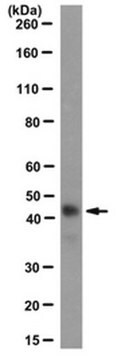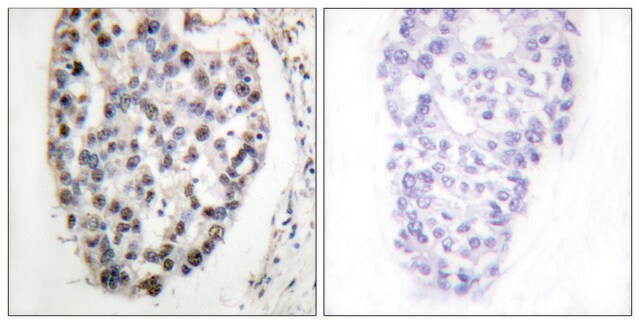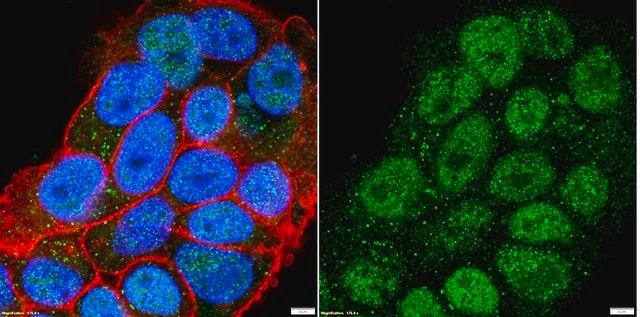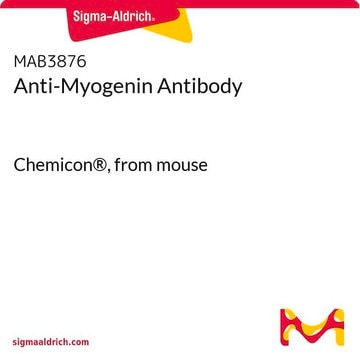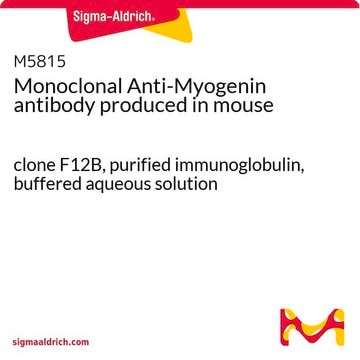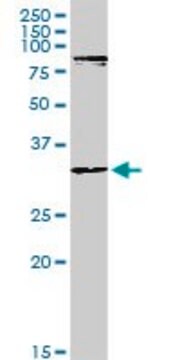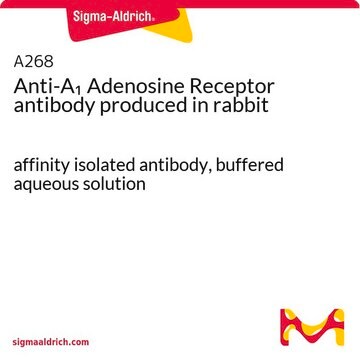推荐产品
生物源
mouse
品質等級
共軛
unconjugated
抗體表格
purified immunoglobulin
抗體產品種類
primary antibodies
無性繁殖
5.2F, monoclonal
形狀
buffered aqueous solution
分子量
antigen 34 kDa
物種活性
human, rat, chicken, mouse
濃度
1.0 mg/mL
技術
immunocytochemistry: suitable
immunohistochemistry (formalin-fixed, paraffin-embedded sections): 2-4 μg/mL
immunohistochemistry (frozen sections): 2-4 μg/mL
immunoprecipitation (IP): 2 μg using 1 mg protein lysate
western blot: 1 μg/mL (reacts with the ~45 kDa protein)
同型
IgG2a
UniProt登錄號
運輸包裝
wet ice
儲存溫度
−20°C
基因資訊
human ... MYOD1(4654)
mouse ... Myod1(17927)
rat ... Myod1(337868)
一般說明
成肌分化抗原1(MYOD1)是一种在骨骼肌中表达的核蛋白。它是碱性螺旋-环-螺旋蛋白(bHLH)转录因子家族的一员。编码它的基因位于人染色体11上。
免疫原
重组小鼠 MyoD1 蛋白。
應用
小鼠中生产的单克抗-MYOD1 抗体已被用于:
- 1:50 稀释度下进行免疫荧光染色
- 免疫印迹
- 1:300 稀释度下进行免疫染色
生化/生理作用
成肌分化抗原1(MYOD1)可能参与将乙酰转移酶和甲基转移酶等酶招募到人类基因组中的成肌增强子上。它参与肌肉的再生并通过激活细胞周期停滞来介导肌肉细胞分化。
外觀
在含有 0.08% 叠氮化钠的磷酸盐缓冲盐水中的溶液。
免責聲明
除非我们的产品目录或产品附带的其他公司文档另有说明,否则我们的产品仅供研究使用,不得用于任何其他目的,包括但不限于未经授权的商业用途、体外诊断用途、离体或体内治疗用途或任何类型的消费或应用于人类或动物。
未找到合适的产品?
试试我们的产品选型工具.
儲存類別代碼
10 - Combustible liquids
水污染物質分類(WGK)
nwg
閃點(°F)
Not applicable
閃點(°C)
Not applicable
Shujie Chen et al.
Bio-protocol, 9(14), e3313-e3313 (2019-07-20)
Myofiber isolation followed with ex vivo culture could recapitulate and visualize satellite cells (SCs) activation, proliferation, and differentiation. This approach could be taken to understand the physiology of satellite cells and the molecular mechanism of regulatory factors, in terms of
Bahar Shahidi et al.
JOR spine, 3(2), e1087-e1087 (2020-07-03)
Many chronic musculoskeletal conditions are associated with loss of muscle volume and quality, resulting in functional decline. While atrophy has long been implicated as the mechanism of muscle loss in these conditions, recent evidence has emerged demonstrating a degenerative phenotype
Bolin Cai et al.
Cellular & molecular biology letters, 29(1), 9-9 (2024-01-05)
Skeletal muscle development is pivotal for animal growth and health. Recently, long noncoding RNAs (lncRNAs) were found to interact with chromatin through diverse roles. However, little is known about how lncRNAs act as chromatin-associated RNAs to regulate skeletal muscle development.
Roy Blum
Journal of cellular biochemistry, 115(11), 1855-1867 (2014-06-07)
The early 1980s revelation of cis-acting genomic elements, known as transcriptional enhancers, is still regarded as one of the fundamental discoveries in the genomic field. However, only with the emergence of genome-wide techniques has the genuine biological scope of enhancers
Xiangyu Sui et al.
Frontiers in oncology, 12, 1040112-1040112 (2022-11-18)
Skeletal muscle atrophy is the major hallmark of cancer cachexia. The mechanisms underlying muscle wasting remain elusive in cachectic patients. Our research seeks to identify differentially expressed genes (DEGs) between non-cachectic and cachectic cancer patients and elucidate their functions. We
我们的科学家团队拥有各种研究领域经验,包括生命科学、材料科学、化学合成、色谱、分析及许多其他领域.
联系技术服务部门